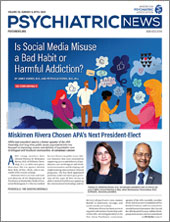Antidepressant Use in Early Pregnancy May Be Linked to Birth Defects
Abstract
Experts say, however, that psychiatrists must weigh the risks of untreated depression and anxiety against the potential risks of birth defects.
Taking certain antidepressants in the early stages of pregnancy may raise the risk of having children with specific birth defects, suggests a study in JAMA Psychiatry.
The risk appears to be most notable for pregnant women who take venlafaxine, which was linked to heart defects, defects of the brain and spine, cleft lip, and cleft palate, among others. However, the study also suggests that some birth defects may more likely stem from the mother’s underlying conditions, thus underscoring the need to weigh the potential risks of taking antidepressants against the risks of untreated depression and anxiety.
The results build upon those of previous, more general studies about antidepressants and the risk of birth defects, said senior author Jennita Reefhuis, Ph.D., acting director of the Division of Birth Defects and Infant Disorders at the Centers for Disease Control and Prevention’s National Center on Birth Defects and Developmental Disabilities.
“With this research we wanted to look at individual medications and their link with individual birth defects, while also trying to separate the effect of medication use from that of the underlying health condition,” Reefhuis told Psychiatric News.
Reefhuis and colleagues examined data from 30,630 mothers of infants with birth defects and 11,478 mothers whose infants did not have birth defects in the National Birth Defects Prevention Study (NBDPS). The NBDPS took place between 1997 and 2011 in Arkansas, California, Georgia, Iowa, Massachusetts, New Jersey, New York, North Carolina, Texas, and Utah. Mothers in the study participated in telephone interviews six weeks to two years after their estimated delivery date and were asked about their use of citalopram, fluoxetine, paroxetine, sertraline, venlafaxine, and bupropion during the three months before conception or during pregnancy. The participants could also report the use of other antidepressants and medications. For this study, the researchers defined early pregnancy exposure to antidepressants as using one or more antidepressants from the month before conception through the third month of pregnancy.
Early antidepressant use was reported by 5.1% of mothers whose infants had birth defects, compared with 4.1% of mothers whose infants did not have birth defects. Compared with mothers who did not take antidepressants in early pregnancy, those who took selective serotonin reuptake inhibitors (SSRIs) were more likely to have infants with heart defects. For example, mothers who took fluoxetine were more likely to have infants with anomalous pulmonary venous return or aortic stenosis. However, when the researchers accounted for the mothers’ underlying mental health conditions, the risk, while still elevated, appeared to be slightly lower.
“Our study findings support the finding from a few other studies that the relationship between specific SSRIs and having a baby born with a heart defect may be due to underlying conditions or factors related to the mother’s underlying medical conditions,” Reefhuis said.
Nonetheless, the risk of non-heart birth defects remained, even after partially accounting for the mother’s underlying condition. For example, compared with mothers who did not take antidepressants in early pregnancy, those who took sertraline were nearly three times more likely to have infants with diaphragmatic hernia and those who took fluoxetine were roughly 2.6 times more likely to have infants with esophageal atresia.
“This may suggest that the risk for these defects could be due to the medication, but more research is needed before we can confirm this,” said Reefhuis.

Untreated depression and anxiety are linked to a host of conditions that affect maternal and child health, says Jennifer Payne, M.D.
Jennifer Payne, M.D., an associate professor of psychiatry and behavioral sciences and the director of the Women’s Mood Disorders Center at Johns Hopkins Medicine, said that the results should be interpreted with caution, noting the risks of untreated depression on maternal and child health.
“Studies have repeatedly shown that depression during pregnancy is associated with an increased risk of having a C-section, pre-term birth, preeclampsia, [and other conditions],” said Payne, who was not involved in the research. “If a mother is depressed during pregnancy, the baby may be born with higher levels of [the stress hormone] cortisol and may have higher levels of cortisol through adolescence.”
She added that mental illness is associated with a host of other conditions, such as diabetes, cardiovascular disease, and obesity, that are known to affect outcomes in pregnancy.
Payne noted the link between depression during pregnancy and postpartum depression, which also carries risks. “Postpartum depression may affect infant IQ development and [contribute to] psychiatric problems later.”
Overall, venlafaxine appeared to have the highest proportion of elevated risk for specific birth defects. Compared with mothers who did not take antidepressants in early pregnancy, those who took venlafaxine were 2.15 times more likely to have an infant with a heart defect, 2.27 more likely to have an infant with a septal defect, 2.6 times more likely to have an infant with a neural tube defect, and 3.39 times more likely to have an infant with a cleft lip, with or without cleft palate. However, only 21 women in the study reported taking venlafaxine, which Payne said could be considered a limitation of the research. She added that venlafaxine, like other serotonin-norepinephrine reuptake inhibitors (SNRIs), is usually not a first choice for treating depression.
“SNRIs are generally prescribed for people with more serious illness. You don’t just jump to an SNRI. You start with an SSRI,” Payne said. “Or you prescribe an SNRI for people who have other comorbid conditions like pain syndromes. People who take SNRIs are different from the general population and the population of women taking SSRIs [to begin with].”
Payne expressed concern that some patients and their doctors may interpret the results as a warning that pregnant women should not take antidepressants at all.
“If a woman has mild depression or mild anxiety and wants to come off a medication, I support that, but if their depression or anxiety is moderate to severe, the preponderance of evidence is overwhelming that they should stay on,” Payne said. “The relapse rate of psychiatric illness when women stop taking medications because of pregnancy is around 70% for women who stopped antidepressants and between 85% and 100% for those who stopped taking mood stabilizers.”
Reefhuis stressed the importance of patient education and a good rapport between a woman and her health care team.
“Health care providers play an important role in reviewing safety information and making shared decisions with women about treatments before, during, and after pregnancy. During these discussions, it is important to balance the risks and benefits of medical treatment with the potential risks to women and their developing babies of untreated depression or anxiety,” she said. “It is also important to keep in mind that with every pregnancy, a woman starts out with a 3% chance of having a baby with a birth defect, regardless of underlying health conditions or medication use.”
Overall, the study’s findings underscore the importance of research on the comparative safety of antidepressant use during pregnancy, Reefhuis said. “Determining the safety of specific antidepressants may help health care providers and their patients weigh the risks and benefits of different medications to help determine the safest options.”
This study was supported through CDC cooperative agreements under grants to the Centers for Birth Defects Research and Prevention participating in the National Birth Defects Prevention Study (NBDPS) and/or the Birth Defects Study to Evaluate Pregnancy exposureS (BD-STEPS). ■
“Maternal Use of Specific Antidepressant Medications During Early Pregnancy and the Risk of Selected Birth Defects” is posted here.



